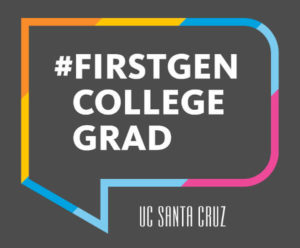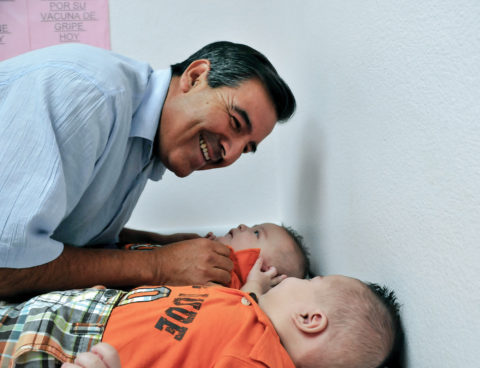Above: Dr. Ramon Resa at 18 months in the backyard of the house in Goshen where he grew up.
Five days a week, Dr. Ramon Resa climbs into his 2016 Ford pickup and drives the curving 16-mile route from his home to his pediatric practice in the town of Porterville, Calif. He drives past the River Island Country Club, the Old Success Quarry, and a sprawl of orange groves where fieldworkers cut sweet fruit from prickly branches.
The drive is only about 20 minutes long, but the memories it brings are decades old: Resa as a second-grader picking oranges from a shaky ladder in the very orchards he is passing. Resa riding in old Chevys that broke down as often as they ran. Resa living in a three-bedroom house with 14 siblings, some days having only rice and beans to eat.
“I think, wow, that’s what I was doing,” says Resa, 65, of his thoughts during his commute, “and now here I am going to the office I bought and the practice I started and then, at night, I can go home to my house with air conditioning and, if it’s hot, I can jump in the pool.”
As he talks, Resa’s voice fills with the kind of awe that makes it seem as if even he doesn’t believe his success. But talk to those who know the man who, at the age of 3, was helping pick cotton, and they’ll tell you that despite poverty, racism, and self-doubt, Resa had a kind of stubborn strength that made him never forget his vow to pull himself out of the fields and to give his own children a better life.
Something to prove

Today, Resa (Crown ‘76, biology) is a successful pediatrician and motivational speaker. His two children have graduated from college. His daughter, Marina (College Nine ‘03, theater arts), is an actress and family- and pet-grief therapist. His son, Josh, is board-certified in pediatrics and has a fellowship in pediatric oncology at Memorial Sloan Kettering Hospital in New York. A documentary film about Resa titled Ramon Rising is expected to be released this fall.
“I wanted to prove something to people,” Resa says of his life, “and that is, if we are given the opportunity to have equal footing, we can succeed.”
Resa was born in Carlsbad, New Mexico, to a single mom with four other children. For reasons he still doesn’t know, Resa’s mother gave away two of her children to neighbors and then left the young Ramon and his two older brothers in the Central Valley town of Goshen with the woman they called grandmother and her husband.
Life in this new household was precarious for the boy. Money was scarce and love was even scarcer. The tiny house pulsed with people, and life centered around survival, which meant everyone had to work in the fields.
“If I could stand, I was picking,” says Resa. “My family had no concerns. I was picking cotton at the age of 3 and driving a truck at 10. They had no concern about us falling into ditches, climbing up ladders, or getting stung by wasps and bitten by black widows (while picking grapes). You were just there to help support the family.”
School wasn’t much better for the quiet boy. Resa, who stuttered, believed all his classmates, especially the Anglo kids, were smarter than he was and barely said a word. Then, one day, his second-grade teacher, Mrs. Lambers, knelt in front of the boy.
“I was just a dirty little Mexican kid who smelled and didn’t shower because we didn’t have hot running water, and she told me I should go to college,” Resa remembers.
That single statement changed his life.
“Sometimes people just say the right thing at the right time,” he says.
A new realization

Dr. Resa with two of his young patients.
— Photo courtesy Jesse Gift/ Ramon Rising
But Resa’s goal to escape poverty didn’t come easily. His high school counselor told him he “wasn’t smart enough” for college-prep classes and should take woodshop instead, and when Resa attempted to get out of the fields by applying for a summer job at a chain department store he was told there were no openings. A few days later, however, several Anglo classmates got jobs there.
Resa also suffered from bouts of depression and had to listen to his abuela tell him that since she’d taken him in, he owed it to her to get a job after high school to help support the family instead of going to college. On the day of his SAT test, she went off to visit a relative and was so late returning to drive him to the exam, he barely slipped inside before the doors were locked. Resa was so shaken, he says, he had to retake the test.
“They had no knowledge of what I was trying to do,” Resa says of his guardians. “What I was doing was beyond the realm of understanding. No one had done it before. No one understood what it meant.”
Then, one day, two men showed up at Resa’s high school. One was older with what Resa described as “Albert Einstein hair,” and the other was younger and familiar-looking. The older man was Roberto Rubalcava, who was then director of Educational Opportunity Programs (EOP) at UC Santa Cruz, and the younger man was Noe Lozano (Porter ‘74, psychology), a student on campus who was studying psychology and had gone to Resa’s high school. They’d come to recruit promising underrepresented students to the nascent campus, promising to help them fill out applications and apply for financial aid.
It was, says Resa, the first time he realized he could go to a four-year university rather than the local junior college. A visit to the wooded UC Santa Cruz campus made him feel like he had arrived in a wonderland of forest, all-you-could-eat food, and new possibilities.
“I just remember him (Resa) being at Crown and he was exchanging his sheets, and he was excited because he never had any sheets before,” recalls his wife of 43 years, Debbie Resa (Porter ‘76, art and biology). “He always only slept on a mattress with a blanket.”
Stubborn strength
Resa had to adjust to having a checking account and to attending classes like organic chemistry that covered familiar topics for many students but, for Resa, who hadn’t taken chemistry in high school, were as alien as if they were being conducted in ancient Greek. His future wife encouraged him, but self-doubt crept in.
Still, Debbie Resa says, her husband, who was also a quick learner, had a stubborn strength that kept him going.
“It’s because for most of my life I’ve been told I’ll never succeed and that I shouldn’t bother trying to achieve goals that are beyond my reach,” writes Resa in his 2011 memoir, Out of the Fields: My Journey from Farmworker Boy to Pediatrician. “I have a chip on my shoulder from being told over and over that I’m not qualified. I’m determined to prove wrong everyone who ever told me that.”
Ernie Moreno (Crown ‘76, politics), who was Resa’s high school friend and college roommate and who would go on to earn a law degree and own his own recruiting company, NextLevel Executive Search, remembers those early years on campus: The excitement of two farmworker kids having their own beds, the lack of Latino role models in professions like law and medicine, and the growth of pride in their heritage as they joined MEChA de UCSC (Movimiento Estudiantil Chicanx de Aztlán) and marched in support of Cesar Chavez and fieldworker rights.
“The EOP office (on campus) went out of its way to make sure we felt like we (he and Resa) belonged,” Moreno says. “The idea was that if you give smart, poor kids good teachers, they will excel.”
Willingness not to give up
When Resa was accepted to UC Irvine’s School of Medicine, he felt like he’d finally arrived.
But, according to him, hopes of being treated as an equal quickly evaporated. The U.S. Supreme Court had just decided the Bakke case, which upheld affirmative action and allowed race to be one of the factors in college admission decisions. At Irvine, Resa says, he overheard Anglo students saying the only reason he was at the college was because of the Bakke decision and, once, a white doctor at the student health center accused Resa of taking a medical-school spot that, he said, should have gone to his son.
For Resa, it was like carrying an extra weight on top of the workload that was a doctor-in-the-making’s life. Sometimes he felt like quitting, he says, but his pledge that his children would never have to live in poverty like he did drove him forward.
He opened his pediatric practice in 1985, treating not only the children of teachers and lawyers but also of those who worked in the orchards, vineyards, and fields.
“What qualities got Ramon from where he was to where he is today?” says Jesse Gift, producer and director of Ramon Rising. “If you ask him, he’ll tell you he was just lucky, that his second-grade teacher got him started on the idea of college and his fourth-grade teacher put him in the front row instead of where the Mexican kids sat in the back and told him he could do better. But I think it was his willingness not to give up.”
Moreno, who says Resa never really talked about his chaotic home life, says there was just something in Resa’s “innards” that drove him to succeed and that when poor, smart kids like he and Resa are given opportunities, they will shine.
Resa sidesteps the question of what set him apart from others in his household, why he was the one who wanted to go to college. But, ask him what he would say to his younger self and he pauses.
“I would say that I should understand that what was going on around me was not my fault. In any other environment, I would have been a totally different person,” he says. “I would say the depression and the shame were brought on by the fact I thought I was going to be a farmworker and that’s what we were told we were going to be. I would tell myself, you are an intelligent person, and you’re going to accomplish a lot when you grow up.”
For more information on the Ramon Rising documentary, visit RamonRising.film.

